Domonkos Tikk
Session-based Recommendations with Recurrent Neural Networks
Mar 29, 2016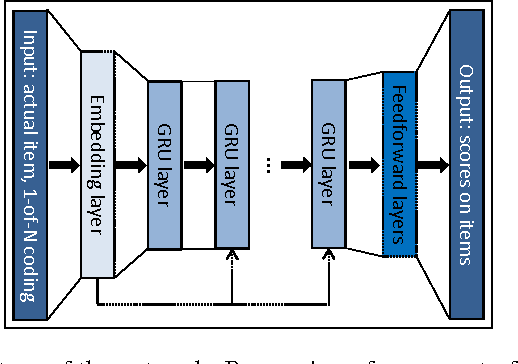

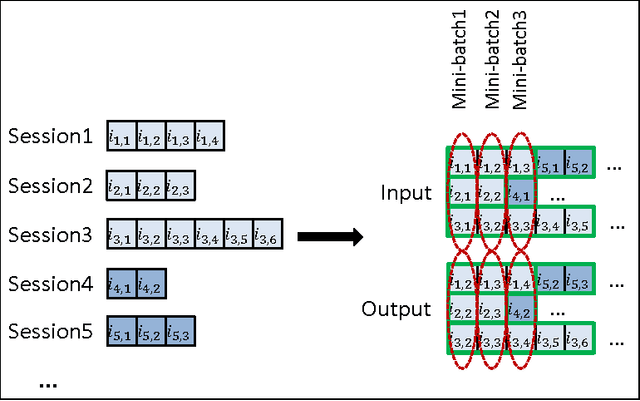

Abstract:We apply recurrent neural networks (RNN) on a new domain, namely recommender systems. Real-life recommender systems often face the problem of having to base recommendations only on short session-based data (e.g. a small sportsware website) instead of long user histories (as in the case of Netflix). In this situation the frequently praised matrix factorization approaches are not accurate. This problem is usually overcome in practice by resorting to item-to-item recommendations, i.e. recommending similar items. We argue that by modeling the whole session, more accurate recommendations can be provided. We therefore propose an RNN-based approach for session-based recommendations. Our approach also considers practical aspects of the task and introduces several modifications to classic RNNs such as a ranking loss function that make it more viable for this specific problem. Experimental results on two data-sets show marked improvements over widely used approaches.
General factorization framework for context-aware recommendations
May 19, 2015
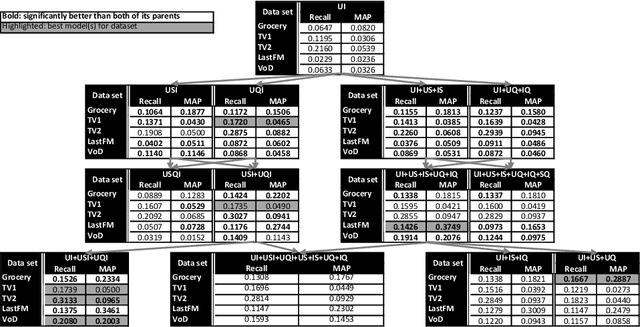
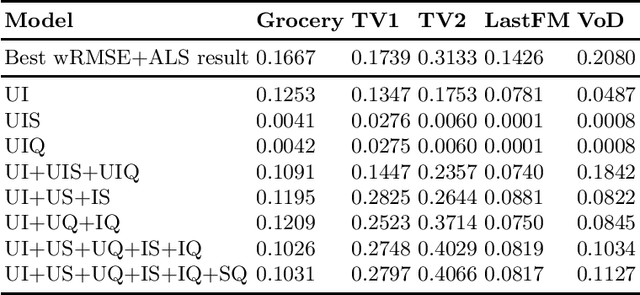

Abstract:Context-aware recommendation algorithms focus on refining recommendations by considering additional information, available to the system. This topic has gained a lot of attention recently. Among others, several factorization methods were proposed to solve the problem, although most of them assume explicit feedback which strongly limits their real-world applicability. While these algorithms apply various loss functions and optimization strategies, the preference modeling under context is less explored due to the lack of tools allowing for easy experimentation with various models. As context dimensions are introduced beyond users and items, the space of possible preference models and the importance of proper modeling largely increases. In this paper we propose a General Factorization Framework (GFF), a single flexible algorithm that takes the preference model as an input and computes latent feature matrices for the input dimensions. GFF allows us to easily experiment with various linear models on any context-aware recommendation task, be it explicit or implicit feedback based. The scaling properties makes it usable under real life circumstances as well. We demonstrate the framework's potential by exploring various preference models on a 4-dimensional context-aware problem with contexts that are available for almost any real life datasets. We show in our experiments -- performed on five real life, implicit feedback datasets -- that proper preference modelling significantly increases recommendation accuracy, and previously unused models outperform the traditional ones. Novel models in GFF also outperform state-of-the-art factorization algorithms. We also extend the method to be fully compliant to the Multidimensional Dataspace Model, one of the most extensive data models of context-enriched data. Extended GFF allows the seamless incorporation of information into the fac[truncated]
Context-aware recommendations from implicit data via scalable tensor factorization
Sep 29, 2013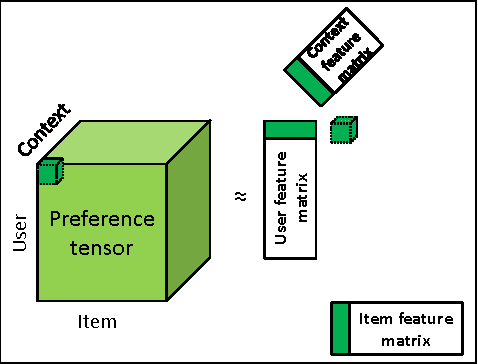

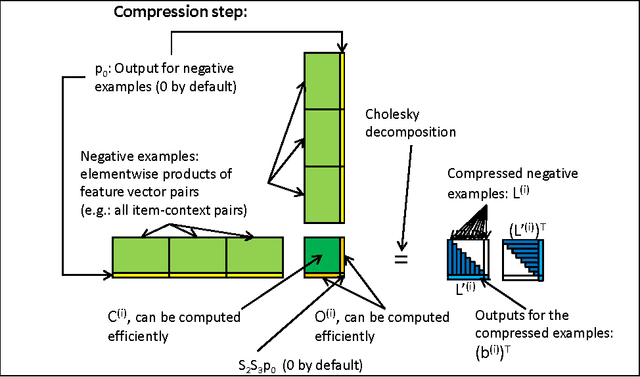
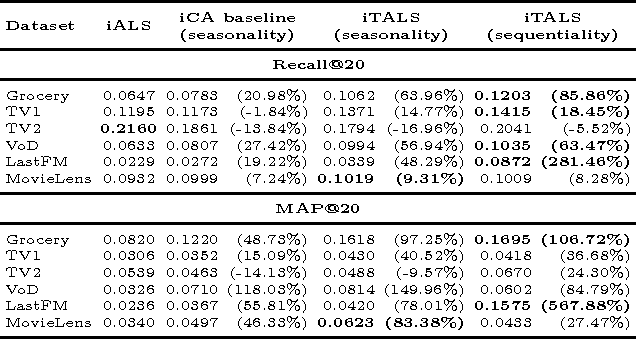
Abstract:Albeit the implicit feedback based recommendation problem - when only the user history is available but there are no ratings - is the most typical setting in real-world applications, it is much less researched than the explicit feedback case. State-of-the-art algorithms that are efficient on the explicit case cannot be automatically transformed to the implicit case if scalability should be maintained. There are few implicit feedback benchmark data sets, therefore new ideas are usually experimented on explicit benchmarks. In this paper, we propose a generic context-aware implicit feedback recommender algorithm, coined iTALS. iTALS applies a fast, ALS-based tensor factorization learning method that scales linearly with the number of non-zero elements in the tensor. We also present two approximate and faster variants of iTALS using coordinate descent and conjugate gradient methods at learning. The method also allows us to incorporate various contextual information into the model while maintaining its computational efficiency. We present two context-aware variants of iTALS incorporating seasonality and item purchase sequentiality into the model to distinguish user behavior at different time intervals, and product types with different repetitiveness. Experiments run on six data sets shows that iTALS clearly outperforms context-unaware models and context aware baselines, while it is on par with factorization machines (beats 7 times out of 12 cases) both in terms of recall and MAP.
Fast ALS-based tensor factorization for context-aware recommendation from implicit feedback
Apr 04, 2013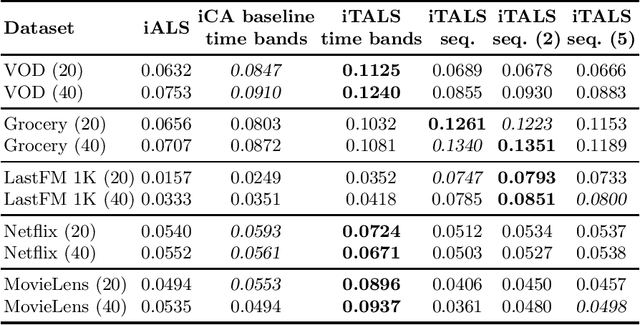
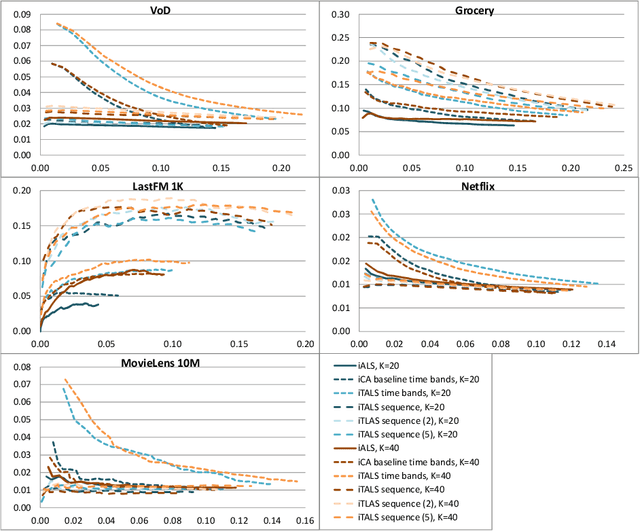

Abstract:Albeit, the implicit feedback based recommendation problem - when only the user history is available but there are no ratings - is the most typical setting in real-world applications, it is much less researched than the explicit feedback case. State-of-the-art algorithms that are efficient on the explicit case cannot be straightforwardly transformed to the implicit case if scalability should be maintained. There are few if any implicit feedback benchmark datasets, therefore new ideas are usually experimented on explicit benchmarks. In this paper, we propose a generic context-aware implicit feedback recommender algorithm, coined iTALS. iTALS apply a fast, ALS-based tensor factorization learning method that scales linearly with the number of non-zero elements in the tensor. The method also allows us to incorporate diverse context information into the model while maintaining its computational efficiency. In particular, we present two such context-aware implementation variants of iTALS. The first incorporates seasonality and enables to distinguish user behavior in different time intervals. The other views the user history as sequential information and has the ability to recognize usage pattern typical to certain group of items, e.g. to automatically tell apart product types or categories that are typically purchased repetitively (collectibles, grocery goods) or once (household appliances). Experiments performed on three implicit datasets (two proprietary ones and an implicit variant of the Netflix dataset) show that by integrating context-aware information with our factorization framework into the state-of-the-art implicit recommender algorithm the recommendation quality improves significantly.
* Accepted for ECML/PKDD 2012, presented on 25th September 2012, Bristol, UK
 Add to Chrome
Add to Chrome Add to Firefox
Add to Firefox Add to Edge
Add to Edge